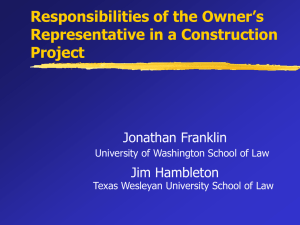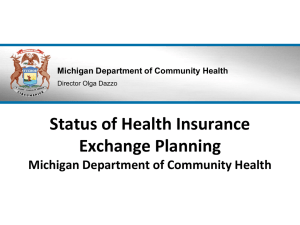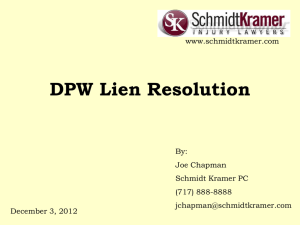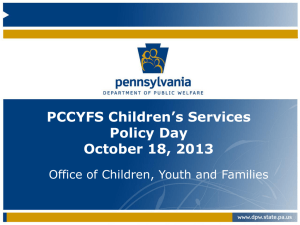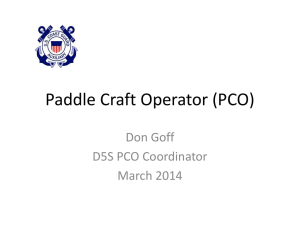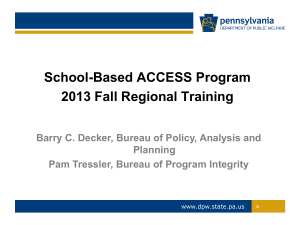MA expansion PHMC 10-28-14 final 10-30
advertisement
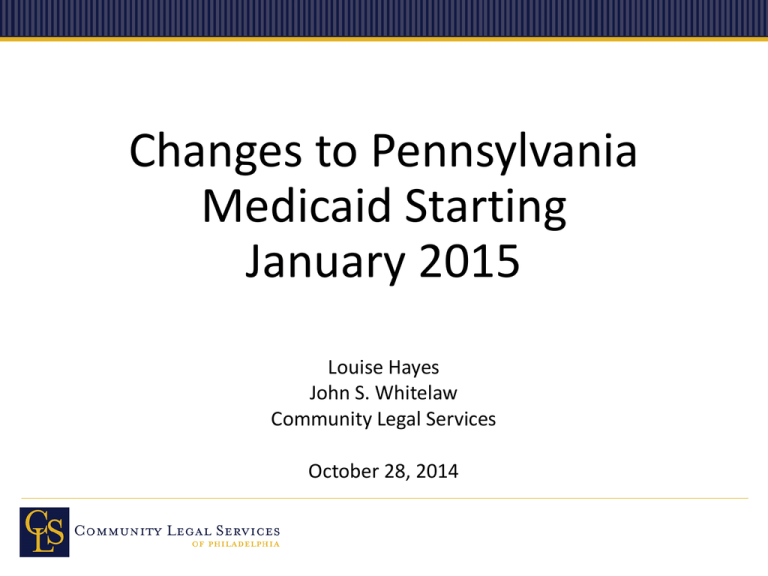
Changes to Pennsylvania Medicaid Starting January 2015 Louise Hayes John S. Whitelaw Community Legal Services October 28, 2014 Agenda for Today • Who is newly eligible for MA starting in January? • How to apply, and how to get help. • Changes to how MA is provided. (that is, what card is issued) • Changes to what services are covered by MA. 2 Not Covered Today • Details of the Healthy PA proposal – which pieces were approved and which rejected. • See handout. • Coverage through the Marketplace (open enrollment starts Nov. 15). 3 Main Messages for Today • Spread the word: MA is expanding! Almost all lowincome people now qualify. • Help people to apply. • Help people with serious medical needs – or who need to be in CBH – get the “Healthy Plus” (high risk) plan. • Appeal service denials as needed. • Send clients who are denied MA to legal services. 4 Great News: Medicaid Expansion • Starting January 1, adults below age 65 with income below 138% of poverty qualify for Medical Assistance. • They are eligible even if they are working, and do not have children or a disability. Roughly 600,000 Pennsylvanians! • No asset test, no criminal record restrictions. 5 Income Limits for Expansion Population Household Size Monthly Income 1 $1,342 2 $1,809 3 $2,276 4 $2,743 5 $3,210 6 $3,677 6 A Few Exceptions • Expansion covers EVERYONE in Pennsylvania under 138% of poverty, with a few exceptions: • People over 65 • People receiving Medicare. • Both these populations are still eligible for Healthy Horizons if their income is below 100% of poverty and they meet asset limits. • MAWD is still available for working people under 65 with disabilities and higher income or assets. • No changes to rules for immigrants. • 5-year bar remains in place. 7 Income-Counting Rules For Expansion Population • DPW will use MAGI income-counting rules for almost everyone applying for MA. • MAGI = Modified Adjusted Gross Income. • Used for the expansion population and also children, pregnant women, parents, and former foster kids. • Current SSI income-counting rules still apply to people with disabilities or aged 65+. (E.g., count only half of earned income.) 8 MAGI Income-Counting Rules • Based on tax rules • Two steps: • Who is in the household? • Based on expected tax filing status for the year of application, with some exceptions. • Non-tax-filers: generally count parents, step-parents, and children together. • What income counts? 9 What Income Counts? • Taxable income counts. This does not include the following: • • • • • • • SSI TANF Workers’ compensation Veterans’ benefits Child support Gifts Income of children (unless they must file their own taxes) • Social Security does count. • Medicaid counts current monthly income, not a projection of annual income. 10 Some Medicaid Remains the Same • The Affordable Care Act did not change Medicaid for seniors or people with disabilities. • Programs include: • • • • • Healthy Horizons, MAWD, Waiver, Nursing Home programs, and Automatic MA for SSI recipients. 11 Healthy Horizons Medicaid • Individuals may receive Healthy Horizons if they are 65 and older or have disabilities that will last for twelve months or longer. • $2,000 asset limit for single adults; $3,000 for couples and families. 2014 Income Limits* – 100% FPIG 1 $ 973 2 $ 1,311 * $20 income disregard; $65 plus 50% earned income disregard. 12 Medical Assistance for Workers with Disabilities (MAWD) • Individuals with too much income or assets for Healthy Horizons may receive Medical Assistance for Workers with Disabilities (MAWD) if: • They have disabilities that last for twelve months or longer. • They work at least one hour per week. • AND they are under age 65. • They will be required to pay a premium based on income (5%) – usually $50 to $100 per month. 2014 Income Limits* – 250% FPIG 1 $ 2,432 2 $ 3,278 * $20 income disregard; $65 plus 50% earned income disregard. • $10,000 asset limit for everyone. 13 Other Remaining Medicaid Categories • Parents with very low incomes (TANF-related) • A subset of the expansion population • Young adults aging out of foster care (to age 26) • No income limits! • Breast and Cervical Cancer Treatment Program (BCCTP) 14 Immigrant Eligibility for Medicaid and CHIP • The rules for immigrant eligibility for Medicaid have not changed under the ACA. • Lawfully present immigrants who are pregnant or children are eligible for Medicaid without a wait. • Certain other “qualified immigrants” – refugees, asylees, Cuban-Haitian entrants, and some others – are eligible without a wait. • Most other qualified immigrants – LPRs especially -- must be lawfully present for five years to qualify for federally funded Medicaid. • Called the “five-year bar.” 15 Immigrant Eligibility for Medicaid and CHIP (cont’d) • Immigrants subject to the “five-year bar” may qualify for state funded Medical Assistance if they meet very low income limits – though DPW has said this program is ending. • Otherwise, lawfully present immigrants who are not eligible for Medicaid because of their immigration status, as well as undocumented immigrants, may qualify for Medicaid only if they have an emergency medical condition. • Lawfully present immigrants may qualify for subsidies through the Marketplace, even if their income is below 100% of poverty. • Undocumented immigrants and those with DACA status may not receive Marketplace subsidies. 16 How to Apply • Starting December 1, 2014, people can apply directly to the Department of Public Welfare (DPW): • Online, via COMPASS: www.compass.state.pa.us. • By telephone: (866) 550-4355. • By mail. • In person, at their local County Assistance Offices. • Applications can be submitted year-round. 17 Application Processing • Under state law, Medicaid eligibility determinations must be made within 30 days of application. • DPW must send a notice. • Applicants who are turned down may appeal and request fair hearings within 30 days. • Check the status of your application by calling: • (215) 560-7226 in Philadelphia. • (877) 395-8930 in all other Pennsylvania counties. 18 Help with Applications • People who have trouble applying online or by phone can get help with their applications. • Same number for phone or in-person help via Certified Application Counselors: (855) 486-9331 • Callers will get help with the application, or an appointment for face-to-face help. 19 Verification Under the ACA, electronic records are a primary source of information: • DPW must search federal and state databases for certain kinds of proof of eligibility, like social security or UC income or citizenship information. • Other kinds of proof, like state residency, can be proved by self attestation. • DPW will not have access to some income information until 2015, so many people will still have to provide paper documentation of income. 20 Very Limited Auto-Enrollment • DPW will automatically enroll people getting GArelated MA into the expansion group. • DPW will not automatically enroll people receiving SelectPlan for Women, which is ending 12/31/14. • These women must reapply. • DPW will not automatically enroll other people whose income it has already verified, such as • People on SNAP, or • Parents whose children receive MA. 21 What Card Will I Use? Currently: • Managed care (HealthChoices) for most: • One set of managed care plans for physical health (e.g., Keystone First, Health Partners). • Separate managed care plans for behavioral health. CBH is the behavioral health plan for Philadelphia. • Fee-for-service (Access) for some: • • • • Everyone in the initial weeks before enrollment in a plan; Retroactive coverage; People on Medicare and/or receiving waiver services A few others. 22 Third System Starting in 2015: Private Coverage Option • Many people will remain in their HealthChoices managed care plans. • This includes everyone in an SSI-related MA category (such as Healthy Horizons) or who is “medically frail.” • No change in who gets fee-for-service. • Most of the “expansion population” and some current MA recipients will be enrolled in the new Private Coverage Option (PCO) Medicaid managed care system. 23 Private Coverage Option • Pennsylvania is setting up a “private coverage option” (PCO) with 8 managed care companies operating across 9 regions. • PCO plans will share some features with Marketplace plans, but the PCO will be a Medicaid managed care system that operates separately from the Marketplace. • The PCO will also operate separately from the existing Medicaid managed care system, called HealthChoices, which has7 managed care companies across 5 regions. 24 PCO Plans 25 HealthChoices Plans 26 PCO (cont’d) • The PCO is different from Iowa’s and Arkansas’s expansion plans, which use Medicaid dollars to buy Marketplace coverage. • Enrollees can choose among PCO plans in their region, with the help of DPW’s enrollment broker. • We will address which MA enrollees gets which plan, and what services, after a break for questions. 27 Problems with the PCO • Confusing to have separate systems of health plans. • Not all contracts are signed– can they be ready? • Network adequacy issues. • Problems with transitioning from one system to another as income or health changes. • PCO will not have separate behavioral health plans. • CBH will not be the insurer for PCO enrollees in Philadelphia. • Behavioral health providers in Philadelphia will have to sign up with PCO plans. 28 Questions? 29 What Medical Services Do I Get? • No changes to children’s benefits (up to age 21). • But for adults, cuts in services proposed for everyone, not just the expansion population. • Three options for adults: • Two of them will be administered through HealthChoices plans (or fee-for-service). • One of them will be administered by the PCO (or FFS). 30 Proposed Benefits Packages • Pennsylvania has proposed three benefits packages: • Healthy Plus: a more generous “high risk” plan • Delivered via HealthChoices plans or FFS • Healthy: a less generous “low risk” plan • Delivered via HealthChoices plans or FFS • Healthy PA PCO: the same essential health benefits package that Marketplace enrollees get, plus “wraparound” services like choice of family planning provider. • Delivered via the PCO or FFS Proposed Benefits Packages (cont’d) • Current Medicaid recipients with significant medical needs will get the Healthy Plus package. • Others will get either the Healthy package or the Healthy PA PCO package. • Newly eligible people who are “medically frail” will get the Healthy Plus plan. • Everyone else will get the Healthy PA PCO package. 32 Proposed Benefits Cuts Service Current Medicaid Limits Doctor Visits 18 (excluding PCP visits) FQHC Visits Radiology Lab Work No limit No limit No limit Inpatient Acute Hospital No limit Durable Medical Equipment Supplies Healthy Plus Plan Healthy Plan Healthy PA PCO No limit 8 per year $450 per year 3 admits per year (nonemergency) 4 per year (excluding PCP visits) 6 per year 6 per year $350 per year 2 admits per year (nonemergency) No limit $2,500/year $1,000 per year $2,500/year No limit $2,500/year $1,000 per year Unclear No limit No limit No limit No limit No limit No limit Uncertainties about Benefits Cuts • The limits listed for the Healthy (low risk) package are fairly certain. • The limits for the Healthy Plus and Healthy PA PCO packages are less certain. • The Healthy Plus and Healthy PA PCO packages will likely be very similar. • MCOs may choose not to implement the cuts. 34 More on the Healthy PA PCO Package Covered services will be comparable to the Healthy Plus package but: • No non-emergency medical transportation (MATP) • 2015 only – CMS will require MATP starting 2016 • CBH is not the behavioral health insurer in Philadelphia • Each PCO plan will have its own behavioral health network. • Potential continuity of care problems, as current recipients’ doctors may not accept their new PCO plan. • Inability to change PCO plans after 3 months (until 1 year) 35 Challenging Service Denials • Service denials can be appealed, but the standard for a “benefits limits exception” is very strict: • A person must prove that s/he “has a serious chronic systemic illness and denial of the exception will jeopardize the life of or result in the serious deterioration of the health of the recipient.” • The appeals process is complicated and time consuming, and most requests are denied. But the fight may be worth it. • To make the benefits limits exceptions process less burdensome, Pennsylvania could choose to “automate” exceptions for certain recipients who bump up against certain benefits limits. Who Gets Which Package? Healthy Plus (high risk) Healthy (low risk) Healthy PA PCO (Essential Health Benefits) Administered by HeatlhChoices plans or fee-for-service (FFS or Access)) Administered by HealthChoices plans or FFS Administered by PCO plans or FFS For: • People 65+ or disability MA categories like Healthy Horizons or MAWD • Anyone who is “medically frail “ • Some others For people who are not medically frail and who are: • Parents or caretakers receiving MA in the TANF category, or • Former foster care children For people who are not medically frail and who are: • In the expansion population, or • Currently eligible for MA in a state-funded category 37 Who Gets the Healthy Plus (High Risk) Plan? • Some Medicaid recipients will qualify for Healthy Plus automatically: • People on SSI or in disability categories, including Healthy Horizons or MAWD. • People in nursing homes or receiving long term care at home. • Pregnant women. • People over 65. • Anyone who is “medically frail” will also qualify. Who Is Medically Frail? • Establishing medical frailty is the key to getting the Healthy Plus (high risk) package. • Therefore it is also the route to getting into CBH. • DPW has a definition, a screening questionnaire, and a “validation” process. It is unclear how these processes fit together. • DPW decisions on medical frailty can be appealed. 39 Definition of Medical Frailty (see handout) Individuals with: • A disabling mental disorder • A chronic substance use disorder • Serious and complex medical conditions • A physical disability • An intellectual or developmental disability • A Social Security disability determination 40 Determining Medical Frailty For Current MA Recipients • DPW has reviewed its claims data for all current MA recipients for medical frailty. • This review was automated via software that focuses primarily on physical health issues. • Based on claims data, some current recipients have been found medically frail and will be moved to Healthy Plus. • These are in addition to those who are 65+ or receiving Healthy Horizons or other SSI-related MA, who will also receive Healthy Plus. • DPW may review claims data for medical frailty midyear, and shift some recipients to Healthy Plus. 41 Determining Medical Frailty For Current MA Recipients (cont’d) • All current recipients will be sent a letter in November, saying what benefit package DPW plans to give them. • For people whom DPW plans to give the Healthy or Healthy PA PCO package, the letter will offer the chance to complete a health screening form. • The form can be completed online on COMPASS. • It can also be completed by phone: (844) 290-3448 42 Determining Medical Frailty For Current MA Recipients (cont’d) • The screening form will ask questions like: • How many visits have you made to a hospital or ER in last 12 months? • How many prescriptions do you take? • How would you describe your mental health? • Do you have any of the following diagnoses? … • Is a friend concerned about your use of drugs or alcohol? • Have you been treated for substance use problems in the last 12 months? 43 Determining Medical Frailty For Current MA Recipients (cont’d) • Completing the health screening form is optional, but current enrollees who are invited to complete it, and do not, will not get Healthy Plus. • They will get the Healthy or the Healthy PA PCO package instead, depending on their current category of MA. • If people complete the screening form, DPW medical staff will review their answers and “validate” the information through calls to treating doctors . • The standard DPW medical staff will use to determine medical frailty based on the screening form is unclear. 44 Determining Medical Frailty For Current MA Recipients (cont’d) • Formal notices of assignment to one of the three benefits packages will be sent in December. • The notices will not say that benefits are being cut, or that the Healthy plan is worse than the Healthy Plus plan. • People with serious medical needs should appeal the notice assigning them to Healthy or the Healthy PA PCO package, and submit an PA 1663 if possible. 45 Determining Medical Frailty for New Applicants • Health screening form will be included with the application. • DPW clinical review team may “validate” the screening form with claims data, if available, and/or calls to treating doctors. • Unclear what standard DPW will use, as many in this uninsured population will have no claims data and not have treating doctors yet. 46 Problems with Medical Frailty System • Difficulties with completing the screening form • • • • • Stigma Literacy or language issues Concerns about confidentiality No “other” box for identifying unusual diagnoses Won’t capture new conditions • Relationship of screening form to definition of medical frailty is deliberately opaque. • Calls to doctors are intrusive. 47 What If I Need the Healthy Plus Plan Between Redeterminations? • DPW will only offer the health screening form at application and redetermination. • If one needs to switch to Healthy Plus between redeterminations, use a different form: the PA 1663 Employability Assessment Form (EAF). • EAF is familiar to doctors. • Likely box 1 or box 2 must be checked • Box 1 or 2 has long been the entryway into Healthy Horizons or MAWD. • 12 month disability can include a retroactive period 48 Employability Assessment Form (PA 1663) 49 Employability Assessment Form • The language on the form (PA 1663) is confusing: • EAF claims to measure whether clients are unable to engage in “any gainful employment” because of disability. • In practice, EAF measures disability rather than employability – otherwise, programs like MAWD could not exist! 50 Use of EAF to Switch to Healthy Plus • DPW says if someone hands the EAF to the welfare office between redeterminations, DPW will assess to see if the person should be put in Healthy Horizons or MAWD. • If category is changed to Healthy Horizons or MAWD, the person will be put in Healthy Plus. • If the person does not qualify for a change in category (e.g., because of assets), CAO will forward EAF to medical team to decide medical frailty. 51 Disagreeing with Medical Frailty Determinations • DPW’s decision that someone is not medically frail can be appealed. • Recipients will get a notice of which package they will get, with an appeal form. • People who need Healthy Plus should appeal! • Providers should help by giving patients an EAF checking box 1 or box 2 (for 12 month disability), ideally to be submitted with the appeal. 52 Major Concerns With New System • Readiness/ network adequacy of PCO plans • Lack of CBH carveout from PCO in Philadelphia • Continuity of care for those transferred to the PCO. • Churning across plans • Service denials (due to benefits cuts) • Difficulty getting into Healthy Plus plan when circumstances change • Lack of transparency and consistency in who gets Healthy Plus 53 Main Messages for Today • Spread the word: MA is expanding! Almost all lowincome people now qualify. • Help people to apply. • Help people with serious medical needs – or who need to be in CBH – get the “Healthy Plus” plan. • Appeal service denials as needed. • Send clients who are denied MA to legal services. 54 Questions? • Louise Hayes • lhayes@clsphila.org • (215) 227-4734 • John S. Whitelaw • jwhitelaw@clsphila.org • (215) 227-2403 55
